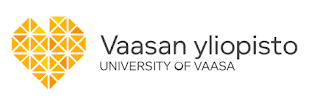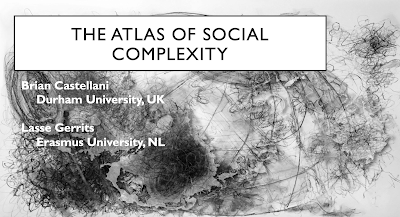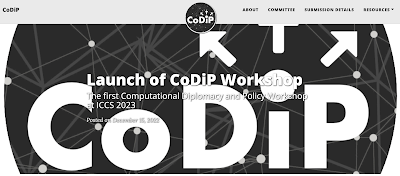As some
readers may recall, my colleague CoreySchimpf and I published an article in
2022 identifying a new area of methods development, called smart and approachable methods or AM-Smart for
short. CLICK HERE for an open access copy of the article at IJSRM.
What are AM-Smart methods?
AM-Smart
methods emerged over the last several years out of the intersection of smart technology, human-computer
interface, educational design and interdisciplinary methods. AM-Smart platforms
address a major challenge for applied and public sector analysts, educators and
those trained in traditional methods: accessing the latest advances in
interdisciplinary (particularly computational) methods.
AM-Smart
platforms do so through nine design features. They are (1) bespoke tools that
(2) involve a single or small network of interrelated (mostly computational)
methods. They also (3) embed distributed expertise, (4) scaffold methods use,
(5) provide rapid and formative feedback, (6) leverage visual reasoning, (7)
enable productive failure, and (8) promote user-driven inquiry; all while (9)
counting as rigorous and reliable tools.
Examples
include R-shiny programs, computational modeling and statistical apps,
public-sector data management platforms, data visualization tools, and smart
phone apps.
What about ChatGPT for advanced data analysis?
What we had
not thought about was that advances such as ChatGPT also constituted a form of
AM-Smart methods. That is until today, when I saw an advertisement for a 2-day instats workshop by Peter Gruber, titled, appropriately
enough, UsingChatGPT for Advanced Data Analysis. Here is the brief description of
the workshop:
This 2-day workshop teaches
researchers, from PhD students to professors, how to use ChatGPT and its
Advanced Data Analytics tool for statistical analysis without writing a line of
code or even knowing how to use a statistics program. The seminar covers a
range of topics from data preparation and descriptive statistics to regression
analysis, advanced statistical tests and visualisation. Special emphasis is
placed on understanding the workings and limits of AI models such as ChatGPT
and reflecting on its implications for data analysis.
In addition
to the description of the workshop, what caught my eye was the instats description
of Gruber’s work around teaching methods.
Dr Gruber has been an early adopter of Large Language Models for
teaching and research and leads the efforts of USI to integrate LLMs into the
curriculum. He has been teaching statistics, financial econometrics and
numerical methods with MATLAB, Python and R since 2005 at USI, University of
St. Gallen, University of Geneva and Bocconi.
This was insightful, because it suggested the approach that is very much driving the AM-Smart movement. Which is super cool.
This is not the only workshop!!!
To lean
more, I started exploring on Google if other such workshops or courses were
being offered. They are being offered! Lots of them. A whole new field of study and pedagogy
seems to have emerged over night! Digital sociology and data science have a lot
to think about!
Which led
me to next ask, What is ChatGPT for advanced data analysis?
What is ChatGPT for advanced data analysis?
The best I
can understand is that in August 2023, ChatGPT recently launched a new business
version called ChatGPT Enterprise. Part
of the package is the revamping of what used to be called CodeInterpreter – one of the quickly expanding list of Plugins being
developed for ChatGPT – into its new version called Advanced Data Analysis – click
here for a nice summary.
Let’s not get too excited!!!!
As Corey
and I outlined in our articleon AM-Smart methods, while offering new possibilities for data analysis, critical reflection on AM-Smart platforms reveals considerable unevenness in these design
features, which hamper their effectiveness.
A rigorous
research agenda is vital.
A case in
point is ChatGPT Advanced Data Analysis.
· First, while currently free,
it is not clear if it will not stay that way for long. This is potentially a major issue and goes
against the open-access environment of current science and programming
platforms such as R.
· Second, it is not a bespoke
suite of methods. It is unclear what sorts of algorithms are used in the background
to do the work. What are the limits of these methods?
· Third, it is not as user-friendly as
it suggests. Part of the whole point of AM-Smart methods is ease of access. For example, there are limits to what data can be used and
how it can be used. I am sure these issues will be addressed going forward, but
presently the plug-in seems to be very much at the ground level.
· There is still a significant
learning curve to using it, including getting the plug-in to work.
· Then there is the issue of
data safety and access globally!
Then there is the question
of pedagogy and value for teaching. It is key to have methods experts such as Peter Gruber involved in the development of AM-Smart methods, such as ChatGPT. There are so many questions to explore. Is this a good way to learn statistics? Is fast statistics good statistics? What about gaming? Is that a good way to use methods? For example, I am
increasingly worried about students not learning the math behind the methods
they use, in the case of numerical analysis, and, in turn, the craft of qualitative
inquiry, as in the case of ethnography.
Conclusion?
My short
conclusion is that ChatGPT is a good example of AM-Smart methods but comes with
lots of concerns that require the methods community to engage with it before endorsing
it.
I do not
make this point nonchalantly, as these sorts of smart tools are not the
necessary future of methods. There is no inevitability here. Instead, there is
lots of room for creative but critical interrogation and development, both for educational purposes and for
the wider usage of methods in research, policy and practice.



















